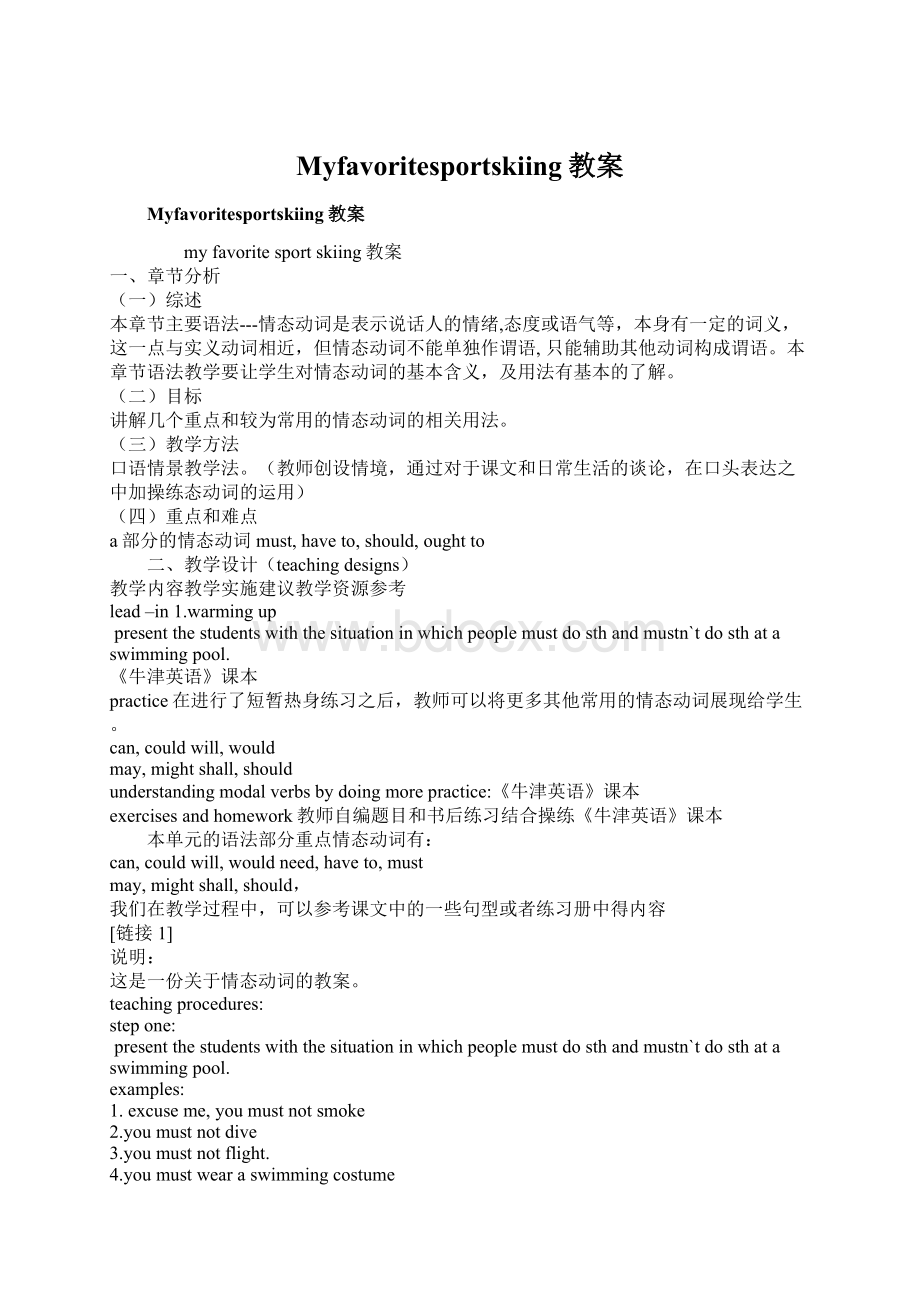Myfavoritesportskiing教案Word格式文档下载.docx
《Myfavoritesportskiing教案Word格式文档下载.docx》由会员分享,可在线阅读,更多相关《Myfavoritesportskiing教案Word格式文档下载.docx(4页珍藏版)》请在冰豆网上搜索。

practice在进行了短暂热身练习之后,教师可以将更多其他常用的情态动词展现给学生。
can,couldwill,would
may,mightshall,should
understandingmodalverbsbydoingmorepractice:
exercisesandhomework教师自编题目和书后练习结合操练《牛津英语》课本
本单元的语法部分重点情态动词有:
can,couldwill,wouldneed,haveto,must
may,mightshall,should,
我们在教学过程中,可以参考课文中的一些句型或者练习册中得内容
[链接1]
说明:
这是一份关于情态动词的教案。
teachingprocedures:
stepone:
examples:
1.excuseme,youmustnotsmoke
2.youmustnotdive
3.youmustnotflight.
4.youmustwearaswimmingcostume
5.youmustshowerbeforeentering
steptwo:
(在进行了短暂热身练习之后,教师有意识地将书中其他使役情态动词haveto,oughtto,oughtnotto的用法呈现给学生。
)
1.“haveto”practicepresentstudentswithexercisea2,askingthemtomakeadialogue
a.m.rockysmileyandmoaner
4:
00getupgetup
15runsixmilescyclewithrocky
6:
30swim1kmswimwithhim
7:
30eatabigbreakfastpreparehisfood
8:
00restplanrocky`straining
s1:
whendoesrockyhavetogetupinthemorning?
s2:
hehastogetupat4a.m.
s1:
whatdosmileyandmoanerhavetodowhilerockyisrunning?
theyhavetocyclewithrockey.
2.“oughtto,oughtnotto”practice(p10)
oughthetothrowhisracketintheair?
no,heoughtnottothrowhisracketintheair.
oughtheberudetohisopponent?
共4页,当前第1页1234
no,heoughtnottoberudetohisopponent.
(这部分是按照书上的情景对话,让学生在情景中自然的使用了情态动词,这种练习比较生活化,对学生来说也比较简单,但是还不足以掌握情态动词的更加深入的用法,所以在下一个步骤,教师有必要将主要的情态动词做系统讲解。
但是要把握难易度,不易太难。
stepthree:
basicuseofmodelverbs
1)表示义务。
意为“必须”(主观意志)。
1.wemustdoeverythingstepbystep.
2.youmustn’ttalktoherlikethat.
3.--mustwehandinourexercise-booksnow?
--no,youneedn’t./no,youdon’thaveto.
mustn’t是“不许”、“决不能”的意思,不是“不必”。
因此在例3中否定回答用needn’t
2)表示揣测。
意为“想必、准是、一定”等,只用于肯定句。
否定句往往用can’t,因为mustn’t是“不许”,“决不能”的意思。
1.hemustbeill.helookssopale.
否定:
hecan’tbeill.heissoenergetic.
2.carolmustgetveryboredinherjob.shedoesthesamethingeveryday.。
carolcan’tbeveryboredinherjob.shedoesdifferentthingseveryday.
对过去发生的事情表示揣测。
i’velostoneofmygloves.imusthavedroppeditsomewhere.
practice:
1.comeon!
we__________hurrybecausethereisn’tmuchtimeleft.
a.mayb.mustc.cand.need
2.amydidbestintheenglishtest.she__________hardlastweek.
a.musthaveworkedb.shouldhaveworked
c.shouldwork d.mustwork
keys:
1.b2.a
must表示主观意志,而have重在客观因素。
但有时候must和haveto可以互换。
1.she’sareallyniceperson.youmustmeether.
2.ihaven’tphonedannforages.imustphonehertonight.
translation:
1.他的视力很差,不戴眼镜无法读书。
hiseyesightisn’tverygood.ihavetowearglassesforreading.
2.好长时间没有给ann联系了,我今晚必须给她打个电话。
youcan’tturnrighthere.youhavetoturnleft.
总结:
must基本用于现在时,除在间接引语中可用于表示过去时间外,其它情况用“haveto”。
1.should
1)should表义务。
意为“应该”(某件事宜于做),用于各种人称。
语气没有must强烈。
youshouldbepolitetoyourteachers.
youshouldn’twasteanytime.
2)表推测,意为“想必一定、照说应该、估计”等。
thefilmshouldbeverygoodasitisstarringfirst—classactors.
theyshouldbehomebynow.
3)表看法或建议
thegovernmentshoulddomoretohelphomelesspeople.
doyouthinkishouldapplyforthejob?
4)表期待
she’sbeenstudyinghardfortheexam,sosheshouldpass.共4页,当前第2页1234
thereareplentyofhotelsinthetown.itshouldn’tbedifficulttofindsomewheretostay.
2.shall
1.shalli/wedosth…?
=wouldyoulikemetodosth
2.shallhe/they…?
shall用于第一人称,表示征求对方的意见。
用于二;
三人称,表说话人给对方的
命令,警告,允诺或威胁.
1.he_____bepunishedifhekeepsoncheatinginexams.
a.shouldb.must
c.shalld.will
2.____ifetchsomechalkforyou,mr.smith?
a.canb.may
c.shouldd.shall
1.c2.d
1)表示能力,could主要指过去时间。
twoeyescanseemorethanone.
couldthegirlreadbeforeshewenttoschool?
?
2)表示可能(理论上或是逻辑判断上)。
thetemperaturecanfallto–60℃,thatis60℃belowfreezing.
hecan’t(couldn’t)haveenoughmoneyforanewcar.
3)表示允许。
canihavealookatyournewpen?
heaskedwhetherhecouldtakethebookoutofthereading-room.
4)表惊异、怀疑、不相信等态度。
主要用于否定句、疑问句或感叹句中。
wherecan(could)theyhavegoneto?
howcanyoubesocareless?
你怎么这么粗心?
5)比较委婉客气地提出问题或陈述看法。
can(could)youlendmeahand?
i’mafraidwecouldn’tgiveyouananswertoday.
1.he_____________fleeeuropebeforethewar
brokeout.
a.couldb.wasabletoc.a&
b
2.–couldiborrowyourdictionary?
---ofcourseyou______.
a.couldb.willc.cand.should
1.b2.c
1)表允许,might可以指过去时间,也可指现在时间,语气更委婉。
youmaytakewhateveryoulike.
hetoldmethatimightsmokeintheroom.
2)表可能(事实上)。
might可以指过去时间,也可以指现在时间,但语气更加不肯定。
hemaybeathome.
shemaynotknowaboutit.
1.老板不在办公室,他可能在打高尔夫球。
thebossisn’tintheoffice.hemightbeplayinggolf.
2.刚才走过去的人可能是你的叔叔。
themanwhopassedbymightbeyouruncle.
4.consolidation(morepracticeaboutmodelverbs)
1.我们家里有足够的食物,不需要买什么了。
共4页,当前第3页1234
2你前日没必要把车卖掉,没钱你可以找我借嘛。
3.我们都知道她错了,但没有一个人敢对她说。
4.你怎么敢这么跟我说话?
5.那个餐馆肯定不错,总是顾客盈门。
keyforreference
1.wehaveenoughfoodathomesoweneedn’tgoshoppingnow.
2.youneedn’thavesoldyourcar.youmighthavecometomeformoney.
3.weallknewshewaswrong,butnoneofusdaredtotellher.
4.howdareyouspeaktomeinsuchaway.
5.thatrestaurantmustbeverygood.it’salwaysfullofpeople.